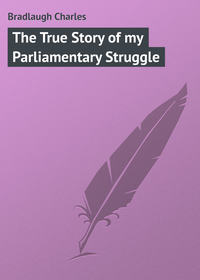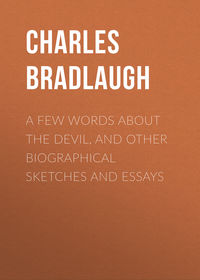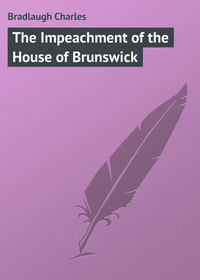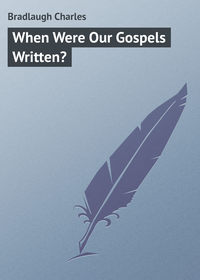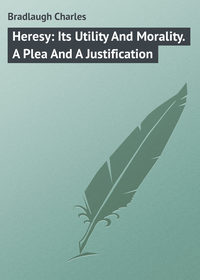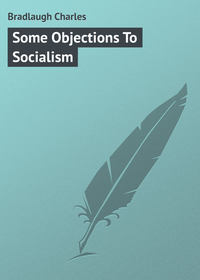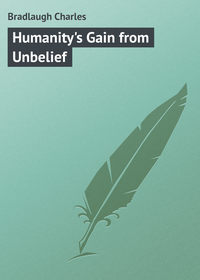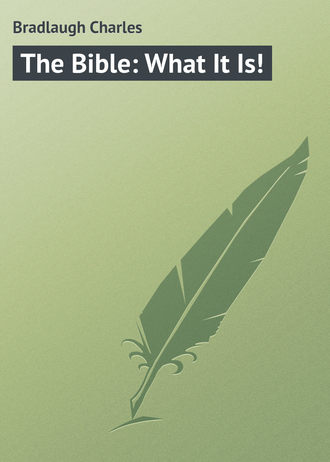 полная версия
полная версияThe Bible: What It Is!
Chapter xv., v. 4. Foxes must have been very plentiful in the country, where Samson then was; but they must have taken some time to catch. The following is a foot-note to the Douay, 'Being judge of the people, he might have many to assist him to catch with nets or otherwise a number of these animals.' It is difficult to conceive why the Philistines so neglected their own interests, and quietly allowed Samson to capture and turn loose these 300 foxes amongst their crops; and I confess that I cannot quite discover the utility and morality of the course pursued by Samson in burning the corn fields. Verses 14 and 15. Shamgar's feat, commented on in page 109, sinks into utter insignificance beside this. 1000 men all killed with the new jaw-bone of an ass – these evidently slain at one time as they fell in 'heaps upon heaps.' If Samson killed the Philistines at the rapid rate of one per minute, which would be good work considering the weapon employed, the slaughter, if conducted without cessation, would then occupy nearly seventeen hours; and we cannot wonder that Samson was 'sore athirst.' The water flowing from the jaw-bone is a miracle. As to miracles, see pages 74 and 75.
Chapter xvi., v. 1. If the rulers of the Israelites were so immoral, the Israelitish people must have been similar in character.
Verses 7 and 11. Truthfulness does not seem to have been one of Samson's qualifications.
Verse 27. I should like to have seen the house which Samson threw down; it must have been a curious specimen of ancient architecture. We are informed that it had an immense roof, supported by two pillars, rather close together, between which Samson stood, and we are also informed, that 3,000 men and women were on that roof 'beholding Samson's play' (vide Douay translation), although, unless the 3,000 could see through the roof, this must have been another miracle, as Samson would be entirely hidden from their sight by the roof and pillars.
I cannot discover the most remote moral connected with the history of Samson; nothing but robbery, wanton destruction of property, immorality, and murder. 1st. He enters into a wager with his wife's friends; having lost his wager, he robs and murders thirty men, to enable him to pay his loss. This career of useless crime and bloodshed is continued, but his own profligacy is ultimately the cause of his being taken prisoner, and punished by the Philistines; yet this is a judge of God's chosen people.
Chapter xix. The number 'nineteen' is badly connected in this book. The remarks on page 36 apply here, but I cannot pass the matter thus. These are God's chosen people, men of the tribe of Benjamin, people whom God has visited personally, men for whom he has slaughtered the unfortunate Canaanites by thousands, and yet so horribly, basely depraved. Where was the fire from heaven this time? Fathers! do you place this book in the bands of your sons and daughters, and tell them that it is the Holy Bible? If you do, will they not learn the horrible state of society amongst God's own selected people? Will they be elevated and improved by the knowledge thus conferred? Will it make them better men and women? I say, no; and every man who devotes thought to the subject will be compelled to echo my denial.
Is it possible that events, so similar as those related in Genesis, chap. xix., vv. 7 and 8, and w. 23 and 24 of this chapter, could have twice happened in the world's history? It cannot be true. If it be true, surely there could never have been a God regulating the affairs of the universe, predestining and permitting such terribly disgusting obscenities and cruelties as those here detailed.
Verse 29. If the twelve pieces were intended for the twelve tribes, this would include the offending tribe of Benjamin, which does not seem to be the meaning of the text.
Chapter xx., v. 28. Phinehas, the grand-son of Aaron, could not have been alive at this period, if we suppose the occurrences related in chronological order. Divines overcome the difficulty by alleging that the last chapters of the book should be the first, as they refer to events immediately succeeding the death of Joshua. A devout believer would reverently admire the mysterious manner in which God revealed his Holy Word upside down; but a thinking man would recognise in this error conclusive evidence against the assertion that the book is a revelation from God.
'The name of this Book is taken from the title of the functionaries, whose actions and administration it principally relates. This name is [ – ] shophetim, plural of [ – ] shophet, a judge. This word designates the ordinary magistrates, properly called judges; and is here also applied to the chief rulers, perhaps because ruling and judging are so intimately connected in the East that sitting in judgment is one of the principal employments of an Oriental monarch.
'The book is easily divisible into two parts; one ending with chap. xvi., contains the history of the Judges, from Othniel to Samson, and the other, which occupies the rest of the book, forms a sort of appendix, relating particular transactions, which the author seems to have reserved for the end. If these transactions had been placed in order of time, we should, probably, have found them in a much earlier portion of the work, as the incidents related seem to have occurred not long after the death of Joshua.
'The author of the Book is unknown. Some ascribe it to Samuel, some to Hezekiah, and others to Ezra. The reason which has principally influenced the last determination of the authorship is found in chap, xviii., v. 30: – "He and his son were priests to the tribe of Dan, until the day of the captivity of the land." But this may have referred to the captivity of the ark among the Philistines, or to some particular captivity of the tribe of Dan; or rather of that part of the tribe settled in the north; or the reference may have been to both circumstances. It is also possible that the clause, "until the day of the captivity of the land," may actually have been added after the captivity. That the book itself was written after the establishment of the monarchical government, appears from the habit which the author has of saying, that the event he is relating happened in the time when " there was no king in Israel," which renders it evident that there was a king when he wrote.' ( Vide 'Hebrew Records.')
The recital of the adventures of Samson, of Micah, etc., with so many slight particulars fully enlarged upon, is conclusive evidence against this Book as a history, for it is impossible to conceive such minute particularity of detail in individual cases, and yet such an utter neglect of even the most general dates in the history of the nation.
BOOK VIII. RUTH
In the Hebrew Bible this book, as mentioned on page 1 occupies a later place.
'The Book of Ruth is properly part of the Book of Judges, from which it has been separated for no very obvious reason. From its brevity it is not likely to contain many passages to aid us in our present inquiry. Those which I have discovered are the following: —
'"Chap. i., v. 1. Now it came to pass in the days when the Judges ruled that there was a famine in the land."
'This was written after the Judges had ceased to rule; and consequently the work is not contemporary with Ruth, who lived "when the Judges ruled."
'"Chap, iv., v. 21, 22. And Salmon begat Boaz, and Boaz begat Obed, and Obed begat Jesse, and Jesse begat David."
'Bishop Patrick's note to this is worthy of notice: —
'"Salmon married Rahab, and therefore lived at the time of the Israelites' first entrance into Canaan. Now between this period and the birth of David are computed 366 years. Thus, as only four generations are mentioned, we must either suppose that some names of persons who come between are omitted (for which we have no warrant), or that, as is more probable, Salmon, Boaz, Obed, and Jesse all had their children born to them at a very advanced period of their lives."
'I propose to adopt a different and more natural solution of the difficulty. In 1 Chronicles ii., 11, Salmon is named "Salma," which shows that there are some doubtful points in this genealogy. This was likely to be the case; for the book being compiled out of original papers, like all the rest of the Jewish History after the captivity of Babylon, the compilers were likely to be puzzled by many discrepancies of this nature, and choosing to preserve as much as possible the form of their original sources, they have retained even their errors also.' (Vide "Hebrew Records.")
Chapter i., v. 15. It seems unlikely that a Jewish woman would recommend her daughter-in-law to commit idolatry.
Verse 22. Ruth did not return to Bethlehem, never having been there before.
Chapter iv. v. 17. Obed was the son of Ruth, the Moabitish woman. He was the father of Jesse, and grandfather of David, and, by the law of Moses, the descendants of a Moabite for ten generations shall not enter the congregation of the Lord (see page 85), so that David, 'the man after God's own heart,' and Solomon, his son, and six of their succeeding generations, were barred out of the congregation. I wonder whether David knew this when he 'danced before the Lord;' or Solomon when about to erect the temple.
Paine spoke of the Book of Ruth as 'an idle bungling story, foolishly told, nobody knows by whom, about a strolling country girl, creeping slily to bed to her cousin Boaz.' Bishop Watson thus comments on this: —
'As to Ruth, you do an injury to her character. She was not a strolling country girl. She had been married ten years; and being left a widow without children, she accompanied her mother-in-law returning into her native country, out of which with her husband and her two sons she had been driven by a famine. The disturbances in France have driven many men with their families to America; if, ten years hence, a woman, having lost her husband and her children, should return to France with a daughter-in-law, would you be justified in calling the daughter-in-law a strolling country girl? But she "crept slily to bed to her cousin Boaz." I do not find it so in the history. As a person imploring protection, she laid herself down at the foot of an aged kinsman's bed, and she rose up with as much innocence as she had laid herself down. She was afterwards married to Boaz, and reputed by all her neighbours a virtuous woman; and they were more likely to know her character than you are. Whoever reads the Book of Ruth, bearing in mind the simplicity of ancient manners, will find it an interesting story of a poor young woman following in a strange land the advice, and affectionately attaching herself to the fortunes, of the mother of her deceased husband.'
The Bishop is apparently indignant that Ruth should be accused of 'creeping slily to bed,' but the Bible account is certainly that without the knowledge of Boaz 'she came softly and uncovered his feet and laid her down.' I cannot find the Bishop's authority for the statement that Ruth lay down at the foot of 'an aged kinsman's bed.' Boaz is not stated to be an old man. He evidently considered that it was necessary to keep Ruth's visit a secret, and appears to have been young enough to have children after his marriage. As for her neighbours reputing her 'a virtuous woman,' that is nothing, for they were not aware of her nocturnal visit to the bed-chamber of Boaz. This book scarcely needs further comment at my hands. It is ridiculous to suppose it to be a revelation from God, and with the exception of Ruth's devotedness to her mother-in-law, there are no points raised in it worthy of a prolonged notice.
BOOK IX. SAMUEL
'The two Books of Samuel form but one in the Hebrew Canon. In the Septuagmt and Vulgate translations they are called the First and Second Books of Kings, and those which we call the First and Second Books of Kings are termed the Third and Fourth Books of Kings. This diversity is to be regretted; ancient histories should at far as is possible be kept in their original form. There seems to be no adequate reason for classifying these books, as they are classified in our Bibles; for they contain quite as much of the history of David as of Samuel. But the impression prevailed that Samuel was their author; and as Protestants in endeavouring to run counter to Roman Catholics, have magnified the importance of the Old Testament exactly in proportion as they have decried the use of reason, the translators have so arranged the Books as to produce the most striking effect; and thus an individual existence has been given to that which has none, but which really is only a part of the whole. Yet, notwithstanding first, the separation of Samuel from Kings, and then its division into two parts, the work bears on the face of it the strong fact that it could not have been written by Samuel: for the twenty-fifth chapter of the first book begins with the words: – 'And Samuel died!' Thus more than half of the whole was obviously composed by a later writer. But we shall see by an examination of the book in order that the whole of it owes its origin to a date later than that of Samuel.' ( Vide 'Hebrew Records.')
Chapter i., v. 5, says that Elkanah gave Hannah 'a worthy portion.' The Douay renders it 'But to Anna he gave one portion with sorrow.'
Verse 6. What 'adversary' is this? The phrase may possibly refer to the other wife, but of this there is not the slightest evidence in the wording of the text; sterility has been a subject of reproach amongst the Jews, as also amongst the Arabs, and some other nations.
Verses 6 to 19. It is probable that in the country district, where the family of Elkanah dwelt, that the barrenness of Hannah was a matter of notoriety. The vow also could not fail to be divulged, and its apparent success to create a great sensation. The superstitious people who traced the hand of God in everything, would of course say that Samuel was his special sift.
Chapter ii., v. 5. 'The barren hath born seven.' If Hannah here referred to herself, she must have spoken in the spirit of prophecy, and even then must have erred in her prophetic dreamings, as by verse 21 she only appears to have had five children, and, excluding Samuel from amongst those, it would still leave one short of the number.
Verse 8. What are these pillars upon which the world is set? How many pillars are there, and upon what do they rest? Or is this an oriental figure of speech not capable of a literal interpretation?
Verses 1 to 10. It is scarcely probable that Hannah the wife of a country farmer composed this song – it is more likely to have been composed by a Levite, or perhaps by the writer of the story.
Verses 13 to 16. 'This narrative presents various subjects of instruction: at first it pictures the simplicity, or rather the grossness of the manners of the times very analogous to the age of Homer. This Hebrew people were mostly composed of rustics, living on their little properties, which they had cultivated with their own hands, as the Druzes do now. The only class, a little elevated, a little less ignorant, was the tribe of Levi – that is, the priests, who lived idle, supported by the voluntary, or forced offerings of the nation; this class had more time than means to employ the mind. This shows itself here in the tone and style of the narrator, who, by his knowledge of the duties of the priests, evinced himself a man of the craft. We might compare this Levite to the monks of the eighteenth and nineteenth centuries, writing: their holy histories under the auspices of superstition and credulity. In this relation we see the essential character of the priest, whose first and constant object of attention is the pot or kettle, on which his existence depends; and this reveals the motives of all that display of victims and sacrifices which play so great a part among the ancients.
'Until now I could not conceive the advantage of converting the courts and the porches of temples into slaughter-houses. [ Vide remarks on page 67.] I could not reconcile the idea of the hideous spectacle of the choking of sensitive animals, of the shedding of oceans of blood, of the filthiness of entrails, with the ideas which we were taught of the divine majesty, of the divine goodness that repels to a distance the gross necessities which these practices suppose. In reflecting on that which has just been noticed, I perceive the solution of the enigma. I see that in their primitive state the ancients were as one; as are yet the Tartars of Asia, and their brothers, the savages of America, ferocious men, contending constantly against dangers, and struggling with those necessities – the violence of which raises all the sensibilities; men accustomed to shed blood in the chase, on which their subsistence depended. In this state, the first ideas which they had – the only ones they entertained of the divinity – represented him as a being more powerful than themselves; but reasoning and perceiving like them, having their passions and their character. The whole history shows the truth of this.
'By this mode of reasoning, these savages thought that every unlucky accident, every misfortune which happened to them, was the consequence of the hate, the resentment, the envy of some concealed agent, of some irascible secret power, vindictive, like themselves, and consequently susceptible like them to be appeased by prayers and gifts. From this idea originated the spontaneous habits of religious offerings, the practice of which shows itself amongst all savages, both ancient and modern. But, as in all times and in all societies, there were men more subtle and more cunning than the multitude, there was soon found some old savage, who, not entertaining this belief, or being undeceived, conceived the idea of turning it to his profit. Supposed to possess secret means, particular recitations for calming the anger of the gods, genii, or spirits, and to render them propitious, the vulgar, ignorant, and always credulous, especially when bound by fear, or stimulated by desire, addressed itself to this favoured mortal. Hence a mediator constituted between man and the divinity: hence a seer, a juggler, a priest, as all the Tartars have, as have most savages and the negroes. These jugglers found it convenient to live at the expense of others, and perfected their art by causing delusions and deceptions. This it was which gave birth to the sacerdotal phantasmagoria. At present, as these physical means are understood, we perceive these artifices in the prodigies of the ancient oracles, and in the miracles of the ancient Magi.
'At the time when the trade became advantageous an association of adepts was formed, and the rules of the association became the basis of the priesthood; but as these associations of divines, of seers, of interpreters, and of ministers of the gods, employed all their time in their public functions, and in their secret practices, it was necessary that their daily and annual subsistence should be provided for by a regular system. The practice, until then casual, of offerings and voluntary sacrifices, was constituted an obligatory tribute; conscience was regulated by legislation; the people led to the altar and the porch of the temple the choice of their flocks, of their lambs, their beeves, and their calves; they brought corn, wine, and oil. The sacerdotal institution had the income, the nation had the ceremonies, the prayers, and everybody was content. The rest does not require explanation; I only remark that the division of animals into pure and impure appears to be derived from their goodness for eating, or the disadvantage as injurious or disagreeable when eaten. Hence the reason why the rank he-goat was rejected in the desert; why the old tough ram was entirely burned; why the measly and scabby hog was despised; but this is saying enough of the kitchen of the priests of Israel.' (Vide Volney.)
The priests of the Israelites are similar in some respects to the priests of the Christian Church. The Jew-priest took all that he could, if not by fair means then by force; our priests follow their example. They have seized a poor old woman's family Bible to pay tithes; they have pocketed tithes until unable to sign their names to the receipts for their income, and then when nearly at the point of death, they have bargained for a handsome retiring pension before they would resign their priesthood; yet these are the men who 'lay up for themselves treasures in heaven, where neither moth nor mot doth corrupt.' Voltaire says: —
'Priests in a state approach nearly to what preceptors are in private families: it is their province to teach, pray, and supply example. They ought to have no authority over the masters of the house; at least until it can be proved that he who gives the wages ought to obey him who receives them.
'Prayer is not dominion, nor exhortation despotism. A good priest ought to be a physician to the soul. If Hippocrates had ordered his patients to take hellebore under pain of being hanged, he would have been more insane and barbarous than Phalaris, and would have had little practice. When a priest says – Worship God, be just, indulgent, and compassionate, he is then a good physician: when he says – Believe me, or you shall be burnt, he is an assassin.
'The magistrate ought to support and restrain the priest in the same manner as the father of a family insures respect to the preceptor, and prevents him from abusing it. The agreement of Church and State is of all systems the 'most monstrous.' (Philosophical Dictionary) Verse 22. The nation must have improved rapidly in morals when its judges and priests were so extremely virtuous. It is instructive to a devout believer to observe that the Church has not degenerated, and that the priests appointed by God were as vicious as those since appointed by the State.
Verse 25. 'Because the Lord would slay them.' What terrible cruelty this seems to harden people's hearts in order to destroy them. But to whom did God make known his intentions? Was it to one man only; to the priest who repeated it? Have we not, then, good reason to attribute it rather to the bearer of the message, to the self-styled interpreter of God's will? It is clear that this could never come from a loving and just God, but rather from a Jewish mouth, from the heart of a fanatic and ferocious Hebrew, full of the passions and prejudices which he attributes to his idol.
Verses 30 to 36. When the immutable Deity decreed that the house of Aaron should be his priests for ever, did he foresee the offences of Eli and his children? If not, his attribute of foreknowledge is taken away; if he did, then the whole story is absurd.
'In this account we have first a conversation divulged. But by whom? Eli would not have boasted of it; it was the man of God who made it known. What interest had he to prepare the minds for a change desired by many, even by the greatest number? In his quality of prophet and preacher this man of God must have known the successor announced. Might he not act already in concert with him? His prediction is found to be in favour of Samuel. Might not Samuel play a part in this affair? The axiom rightly says: – He has done it, who had an interest to do it. Should it not have been Samuel in this case? Observe that Eli was blind, and that any one might have spoken to him, and he not have known the person. There is here the management of knavery. Samuel is not impeached; but he is arraigned. As to the prediction against the two sons of Eli on the same day, it is evident how easy it was to the writer or copyist to interpolate afterwards.' (Vide Volney.)
Chapter iii., v. 1. 'And the word of the Lord was precious in those days; there was no open vision.' What this means I do not profess to explain, but I take the opportunity of allowing Voltaire to deal with the subject generally: —
'When I speak of vision I do not mean the admirable manner in which our eyes perceive objects, and in which the pictures of all that we see are painted on the retina. This matter has been so learnedly treated by so many great geniuses that there is no further remnant to glean after their harvests.
'My subject is the innumerable multitude of visions, with which so many holy personages have been favoured or tormented; which so many idiots are believed to have seen; with which so many knavish men and women have duped the world, either to get the reputation of being favoured by heaven, which is very flattering, or to gain money, which is still more so to rogues in general. 'Calmet and Langlet have made ample collections of these visions. The most interesting in my opinion is the one which has produced the greatest effects, since it has tended to reform three parts of the Swiss – that of the young Jacobin, Yetzer. This Yetzer saw the Holy Virgin and St. Barbara several times; who informed him of the marks of Jesus Christ. He received from a Jacobin confessor a host, powdered with arsenic, and the Bishop of Lausanne would have had him burnt for complaining that he was poisoned. These abominations were one of the causes of the misfortune which happened to the Bernese, of ceasing to be Catholic, Apostolical, and Roman.


